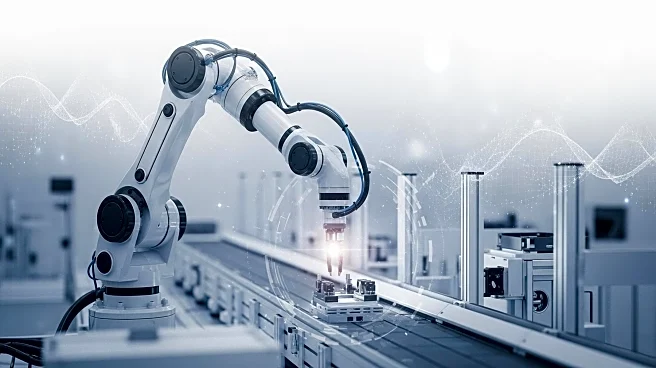What's Happening?
Manufacturers are increasingly investing in artificial intelligence (AI) and automation to enhance their business operations and attract skilled talent. However, they face challenges in balancing rapid technological innovation with the transition of their workforce, which often remains skeptical of these changes. A recent roundtable discussion, sponsored by IFS, highlighted the risks manufacturers face if they do not develop effective talent strategies. Research indicates that 65% of manufacturers are digital laggards, relying on outdated systems, while less than 10% are considered digital leaders. The industry is also grappling with challenges such as technological disruption, cybersecurity risks, and climate change. To overcome these hurdles, manufacturers are focusing on creating new roles like AI engineers and digital supply chain analysts, and are investing in pilot projects to demonstrate the benefits of AI.
Why It's Important?
The integration of AI in manufacturing is crucial for maintaining competitiveness and addressing the industry's stigma of being 'dirty, dark, and dangerous.' By transforming into more technology-driven operations, manufacturers can attract talent with the necessary skills for future growth. This shift not only enhances operational efficiency but also redefines the image of manufacturing as an exciting career option. The adoption of AI is driving new roles and skills, contributing to a more sustainable and innovative industry. As manufacturers implement AI strategies, they must ensure employee engagement and trust, which are vital for successful digital transformation. The broader impact includes improved productivity, sustainability, and the creation of a more attractive industry for future generations.
What's Next?
Manufacturers are expected to continue investing in AI pilot projects to validate the technology's impact and build momentum for wider adoption. These projects will require constructive feedback and active employee engagement to ensure seamless collaboration between human and AI capabilities. As the industry evolves, strategic leadership will be crucial in recruiting and retaining talent to maximize the benefits of smart manufacturing. Companies must focus on reskilling and training their workforce to adapt to new technologies, ensuring that AI adoption is paired with parallel workforce development. The narrative around manufacturing is changing, and companies must communicate the personal relevance and value of AI to their employees.
Beyond the Headlines
The shift towards AI-driven manufacturing raises ethical considerations regarding data usage and transparency. Manufacturers must embed digital ethics within their operations to maintain employee trust and protect business reputation. Additionally, the transformation of manufacturing into a technology-centric industry may influence cultural perceptions, making it a more appealing career choice. This change could lead to long-term shifts in workforce demographics and industry standards, as companies redefine their roles and responsibilities in the digital age.












